2015中考英语专题(13)简单句
- 格式:doc
- 大小:611.00 KB
- 文档页数:20

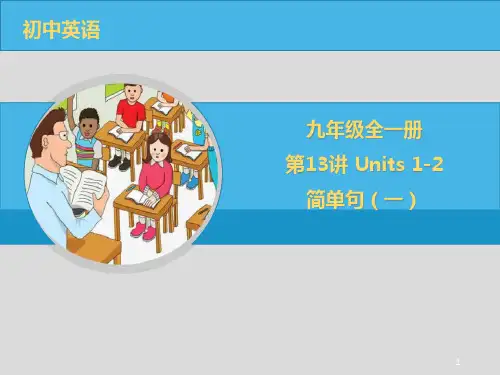

感叹句(共17个)1. (2015广东,38)—So far,Su Binglan is the only Chinese who finished the 100-meter race in less than 10 seconds.—________ he runs!A. How slowB. How fastC. What a slowD. What a fastB【解析】2. (2015贵州安顺,27)—Listen!Someone is playing the piano.—Wow!________ beautiful music!I like it very much.A. WhatB. How aC. What aD. HowA【解析】3. (2015贵州贵阳,14)“Look!________ sunny day it is!How about going hiking?”“That’s a good idea.”A.What a B.How a C.WhatA【解析】4. (2015湖北襄阳,33)—The passenger ship Eastern Star capsized(倾覆) in the Yangtze River on the evening of June 1st.—________ bad news!Can we do something to help with the rescue(救援)?A. What aB. WhatC. How aD. HowB【解析】5. (2015湖北宜昌,40)—Our team has won the first prize in the soccer games.—Congratulations!________ team you are!A. How greatB. What a greatC. What greatD. How a greatB【解析】句意为:——我们队在足球比赛中得了第一名。
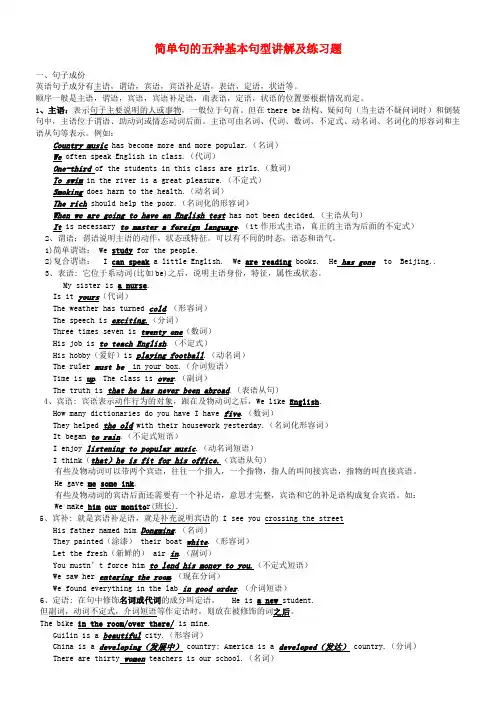
简单句的五种基本句型讲解及练习题一、句子成份英语句子成分有主语,谓语,宾语,宾语补足语,表语,定语,状语等。
顺序一般是主语,谓语,宾语,宾语补足语,而表语,定语,状语的位置要根据情况而定。
1、主语:表示句子主要说明的人或事物,一般位于句首。
但在there be结构、疑问句(当主语不疑问词时)和倒装句中,主语位于谓语、助动词或情态动词后面。
主语可由名词、代词、数词、不定式、动名词、名词化的形容词和主语从句等表示。
例如:Country music has become more and more popular.(名词)We often speak English in class.(代词)One-third of the students in this class are girls.(数词)To swim in the river is a great pleasure.(不定式)Smoking does harm to the health.(动名词)The rich should help the poor.(名词化的形容词)When we are going to have an English test has not been decided.(主语从句)It is necessary to master a foreign language.(it作形式主语,真正的主语为后面的不定式)2、谓语:谓语说明主语的动作,状态或特征。
可以有不同的时态,语态和语气。
1)简单谓语: We study for the people.2)复合谓语: I can speak a little English. We are reading books. He has gone to Beijing..3、表语: 它位于系动词(比如be)之后,说明主语身份,特征,属性或状态。
My sister is a nurse.Is it yours(代词)The weather has turned cold.(形容词)The speech is exciting.(分词)Three times seven is twenty one(数词)His job is to teach English.(不定式)His hobby(爱好)is playing football.(动名词)The ruler must be in your box.(介词短语)Time is up. The class is over.(副词)The truth is that he has never been abroad.(表语从句)4、宾语: 宾语表示动作行为的对象,跟在及物动词之后,We like English.How many dictionaries do you have I have five.(数词)They helped the old with their housework yesterday.(名词化形容词)It began to rain.(不定式短语)I enjoy listening to popular music.(动名词短语)I think(that)he is fit for his office.(宾语从句)有些及物动词可以带两个宾语,往往一个指人,一个指物,指人的叫间接宾语,指物的叫直接宾语。
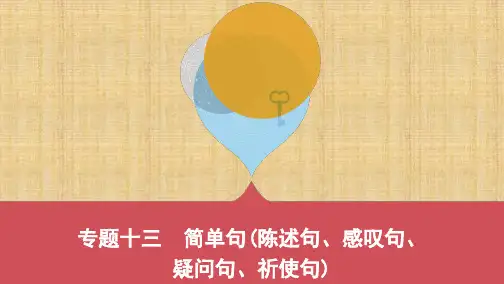
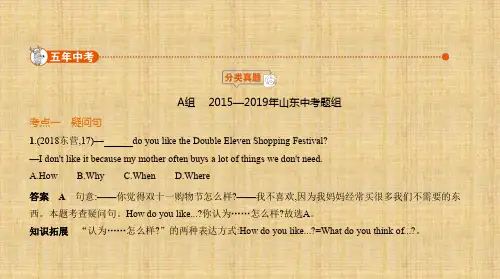


中考复习简单句专项练习单项选择1.--There so many foreigners in the streets these days.-- They might be runners in the Yellow River Estuary (入海口,河口) International Marathon.A. isB. areC. haveD. will be 2.Grace Brown __________ play tennis every day.A.isn‘t B.don’t C.are n’t D.doesn’t.3.—Have they visited the zoo many times.—______________. Only once.A. Yes, they haveB. No, they haven’tC. No, they have 4.“They have a lot to eat and drink.” It is a structure of ________.A. S+V+PB. S+V+IO+DOC. S+V+DO+COD. S+V+DO5.It’s not clever_______ others’ homework.A.for you copy B.for you to copy C.of you to copy D.of you copying 6.________ important _________ us to eat a balanced diet.A. It’s, forB. That’s, forC. It’s, to7.--- of shoes do you wear? - - Size 7.A. WhatB. What sizeC. What kindD. What color8.---_______ her father work? --- In a restaurant.A. What doesB. Where doesC. Where doD. Who does9.It Yang Liwei about 21 hours the earth 14 times in his spaceship.A. spent; circlingB. took; travelingC. spent; to travelD. took; to circle 10.There ________ children playing games in the park.A. has muchB. are manyC. is muchD. a lot of11.Why ____________ enjoy Beijing opera with us?A. not toB. don’tC. notD. you don’t12.It's 9:30 pm, children! ______ is time to go to bed.A. ThatB. ItC. ThisD. They13.It took me two weeks ____ reading the novels written by Guo Jingming. .A. finishB. to finishC. finishesD. finishing 14.It’s very nice ____ some money to me .A. of you to lendB. for you to lendC. for you to borrowD. of you to borrow15.____________ a big party in our school in two weeks.A. It isB. It will beC. There wasD. There is going to be 16.—______ a week do you use your computer?—Twice.A. How oftenB. How soonC. How many timesD. How long17.It ____ over 10 years since my grandpa _______.A. is, diedB. is, has been deadC. has been, was deadD. was, has died 18.—________ does he often go to Beijing? —By plane.A. HowB. WhenC. WhereD. Which19.He ______ be at home, because the light in his room is on.A. mustB. can’tC. canD. might20.–My brother’s never been late for work, ______?–______. He is a hard-working man.A. is he; Yes, he isB. isn’t he; No, he isn’tC. has he; Yes, he hasD. has he; No, he hasn’t21.This sign means “ _____.”A. No parkingB. No U-turnC. No right turnD. No left turn22.He found ___________ hard to finish the work in such a short time.A. thatB. thisC. itD. its23.---___________ ?---It’s cloudy.A. What’s the weatherB. what was the weather likeC. How’s the weather likeD. How is the weather24.It is _____ to cycle around Guilin.A. a great funB. a funC. great funD. a great funny25.It’s dangerous______ a tree.A.climbing, B. going up C.to climb D. clime26.There ________ a sports meeting next week.A. hasB. is going to beC. is going to haveD. will have27.I have never heard______.A. so wonderful a musicB. so wonderful musicC. such a wonderful musicD. such wonderful music28.There is going to _______ a basketball match on the playground this afternoon.A. beB. haveC. hasD. is 29.I think ___is necessary ___ my 20-year-old daughter to have her own mobile.A .that; of B. it; of C. that; for D. it; for二、根据所提供的图画情景、提示词,写一个与图画情景相符的句子。
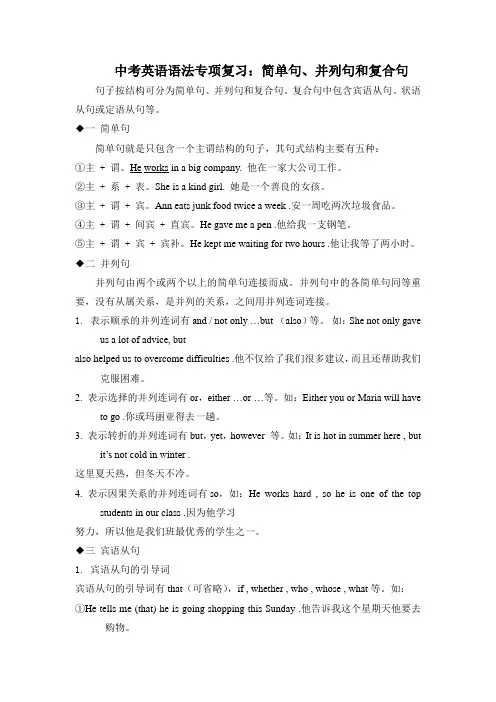
中考英语语法专项复习:简单句、并列句和复合句句子按结构可分为简单句、并列句和复合句。
复合句中包含宾语从句、状语从句或定语从句等。
◆一简单句简单句就是只包含一个主谓结构的句子,其句式结构主要有五种:①主 + 谓。
He works in a big company. 他在一家大公司工作。
②主 + 系 + 表。
She is a kind girl. 她是一个善良的女孩。
③主 + 谓 + 宾。
Ann eats junk food twice a week .安一周吃两次垃圾食品。
④主 + 谓 + 间宾 + 直宾。
He gave me a pen .他给我一支钢笔。
⑤主 + 谓 + 宾 + 宾补。
He kept me waiting for two hours .他让我等了两小时。
◆二并列句并列句由两个或两个以上的简单句连接而成。
并列句中的各简单句同等重要,没有从属关系,是并列的关系,之间用并列连词连接。
1. 表示顺承的并列连词有and / not only …but (also)等。
如:She not only gaveus a lot of advice, butalso helped us to overcome difficulties .他不仅给了我们很多建议,而且还帮助我们克服困难。
2. 表示选择的并列连词有or,either …or …等。
如:Either you or Maria will haveto go .你或玛丽亚得去一趟。
3. 表示转折的并列连词有but,yet,however 等。
如:It is hot in summer here , butit’s not cold in winter .这里夏天热,但冬天不冷。
4. 表示因果关系的并列连词有so,如:He works hard , so he is one of the topstudents in our class .因为他学习努力,所以他是我们班最优秀的学生之一。
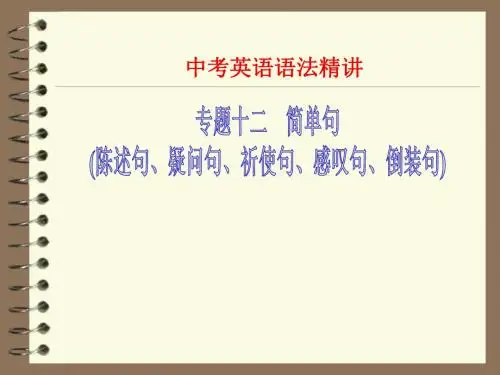

(十一)句子的类型Ⅰ简单句和并列句01 命题趋势考标导向化近几年对简单句的考查主要体现在对陈述句、感叹句、疑问句和祈使句上,对并列句的考查主要是在并列句的构成、并列连词和从属连词上。
预计2015年对简单句的考查仍以感叹句、反意疑问句为主,对并列句的考查以并列连词和从属连词为主。
02 定义概念清晰化简单句是只有一个主语(或并列主语)和一个谓语(或并列谓语)的句子。
根据句子的功能可分为陈述句、疑问句、祈使句和感叹句。
陈述句用来陈述一件事或表达一种看法,有肯定和否定两种形式,句末通常用句号。
疑问句是用以提问的句子,句末用问号。
疑问句又分为一般疑问句、特殊疑问句、选择疑问句和反意疑问句。
祈使句是用以表示命令、请求或建议的句子,通常省略主语。
感叹句是用以表达快乐、痛苦等强烈感情的句子,感叹句有用what或how开头的两种形式。
并列句是指由两个或两个以上的并列分句构成的句子。
并列句的分句间没有修饰和被修饰的关系,也没有限定或被限定的关系,其间的关联是靠并列连词实现的。
03 知识归类知识网络化❶简单句分类图解构成类型例句由一个主语(含并列主语)和一个谓语(或并列谓语)构成1.S+Vi An accident happenedyesterday.2.S+V+P Your idea sounds good.3.S+Vt+O We want to see him.4.S+Vt+O+O My father made me a kite.5.S+Vt+O+C He made us stand here.❷陈述句。
疑问句、祈使句和感叹句分类图解分类用途例句陈述句肯定肯定的陈述,表示“是如此”They usually go to schoolby bike.I get up at six o’clockin the morning.否定否定的陈述,表示“不是如此”They won’t go to the parktomorrow.I can’t speak Chinese.疑问一般询问一件事或情况是否Is this your schoolbag?Have you been to句疑问句属实Shanghai?特殊疑问句针对句子某一具体成分提问What does your father do?Where is Mike from?选择疑问句提供两种或两种以上的情况供对方选择—Is your friend a boy ora girl?—He is a boy.反意疑问句由陈述句+简短问句组成,问话者欲对陈述句部分的内容做进一步证实—There is a book on thedesk, isn’t there?—Yes, there is./ No,there isn’t.祈使句表示命令、请求、建议、劝告等Come in, please.Let’s go to school.感叹句表示惊讶、喜悦、愤怒等感情,常用what或how引导What beautiful flowers!How clever the girl is!特例清单1.否定的一般疑问句通常以be动词、情态动词或助动词与not的缩略形式开头,往往表示惊讶、赞叹、怀疑等语气。
简单句、并列句和复合句考点一简单句1.简单句只包含一个主谓结构.2.五种简单句:1)主+谓. He comes at last.2)主+系+表. She is a teacher.The soup tastes nice.3)主+谓+宾. They reached the village.4)主+谓+间宾+直宾. He gave me a pen.5)主+谓+宾+宾补. I find that book very useful.考点二并列句并列句:两个或两个以上的简单句,用连词连接起来;常用的连接词有:1.表示顺承关系的:and, not only…but also不仅….而且….等;She ______ gave us a lot of advice, _______ helped us to overcome difficulties.Linda tried to become an excellent teacher, _____ at last she succeeded.2.表示选择关系和否定条件的有or还是,否则Do you want to leave now ____ would you rather set off laterWear your coat, ____ you’ll catch a cold.3.表示转折关系的有but, yet等;He is young, but he works hard.虽然他年轻,但工作努力;4.表示因果关系的有for, so 等;My leg hurts so I go to see a doctor. 我的腿疼,因此我去看医生;考点三主从复合句:宾语从句1.宾语从句的引导词1引导陈述句用 that在口语和非正式文体中常常省略He tells me that he is going shopping this Sunday.2 引导一般疑问句用if或whether.She asked me if\ whether she could join us. whether…or not3 引导特殊疑问句,要用原来的特殊疑问词;She asked them what they were doing.2.宾语从句的语序:要用陈述句语序;I want to know when the train left.3. 宾语从句的时态1主句是一般现在时,一般将来时或祈使句,宾语从句可根据实际需要选用各种时态;He tells us that he has been able to look after himself.(2)主句是过去时态,宾语从句应使用过去时的相应时态;They said that they had already finished the work.(3)如果宾语从句叙述的是客观事实、真理、自然现象等,不管主句用什么时态,从句都用一般现在时;He said that light travels faster than sound.3. 练习1She asked me, “Will you go to the cinema tomorrow”改为含宾语从句的复合句She asked me______ I ______ go to the cinema the next day.2 How lovely the dog is Can you tell me _____A. where did you get itB. where will you get itC. where you got it3 --- Can you tell me _____ your parents at home--- I often wash clothes and sweep the floor.A.how will you helpB. how you helpC. how will you helpD. howdo you help4 When I was young, my grandfather told me that the sun ______ rise in the east.考点四状语从句一、状语从句在复合句中作状语,修饰主句中的动词、形容词、副词等;1.地点状语从句地点状语从句通常由 where 引导;Put all the things _____they were.A. whereB. whenC. whoseD. which2.时间状语从句主句用将来时,从句用一般现在时时间状语从句的引导词有when, before, after, until, as soon as, since, while, as 等She was cooking when someone knock at the door.What will you do after you finished your homework3.条件状语从句在条件状语从句中,常用的引导词有if, unless等;If it dosen’t rain, I” ll go fishing.They will have a picnic unless it rains next Sunday.4.原因状语从句原因状语从句常用的引导词有because, as, since既然等He didn’t come because he was ill.Since we are students, we should study hard.Because 和so 不能在一个句子中同时使用;5. 结果状语从句结果状语从句主要由so…that…, such…that…引导;It’s so hot that we want to go swimming.That’s such an interesting story that everybody likes it.So… that…与简单句之间的句型转换1)that后的句子是否定句,常用too…to进行转换;He is so young that he can’t go to school. he is too young to go to school.2)that后的句子是肯定句;常用enough to 进行转换;The shirt was so cheap that he bought it. the shirt was cheap enough for him to buy.6.目的状语从句目的状语从句常用的引导词有so that, in order that 等 in order to 简单句Please say it in a loud voice so that everyone can hear it.He works harder in order that he can go to a good college.7. 让步状语从句引导词有though, although, even if, even though尽管等;He often helps others though\ although he is not rich.They will stand by you even if you don’t succeed.Though, although与but 不能同时出现在一个句子中8.比较状语从句比较状语从句由than, as…as…, not as\so… as等引导;比较级He is more outgoing than I.He ran as fast as Mike.二、练习1. It’s quite common in Britain to say “thank you”to the drivers _____ people get off the bus.a. afterb. sincec. untild. when2. The art club is for members only. You can’t go in ____you are a member.a. unlessb. becausec. ifd. though3. Now many parents send their children to foreign countries, _____ they want them to get a better education.a. untilb. thoughc. because4. ---- What would some students like to do after finishing their education---- They would like to start to work_______ they needn’t depend on their parents completely.a. as soon asb. so thatc. befored. while考点五定语从句修饰某一名词或代词的从句叫定语从句;被定语从句修饰的词叫先行词,引导定语从句的词叫关系词关系代词和关系副词;1.关系代词的基本用法The man __________spoke at the meeting is from Hong Kong. 指人作主语The building ___________is being built will be used as a hospital.指物作主语I visited a scientist _______ name is known all over the world. 指人作定语2. 关系代词特殊用法1当关系代词在从句中作主语时,从句的谓语动词要与先行词保持一致;He is one of the boys who ______ like playing football.He is the only one of the boys who________ like playing football.2 通常以下四种情况关系代词只能用that而不能用which.1 先行词为all, much, something, everything, nothing, little, none, the one 等不定代词时2先行词被形容词最高级修饰时;3当先行词被the only, the very, the just等修饰时;4先行词中既有人又有物时;3. 关系副词的基本用法;1 when 在句中作状语,表示时间;2 where 在句中作状语,表示地点;.3 why 在句中作状语,表示原因;He remembers the day _______ he joined the League.This is the reason_______ he is late today.This is the place _______ Lu Xun was born.1. 2011泰安--- _______do you read English newspapers---I read China Daily every day.A. How longB. How soonC. How oftenD. How far2.2011抚州John had a short walk after lunch, _______A. did heB. didn't heC. had heD. hadn't he3.2011宁波--- _______do you have an Art Festival in your school---Once a year.A. How longB. How oftenC. How farD. How soon4.2011安徽省If you want to go to see the movie this evening, so _______I.A. doB. amC. willD. should5.2011长沙 _______tall the girl isA. HowB. HowaC. WhatD. What a6.2011长沙 _______ call me Mimi It's my cat's name.A. NotB. Didn'tC. Doesn'tD. Don't7.2011长沙They went to the park yesterday,_______A. don't theyB. didn't theyC. aren't theyD. can't they8.2011福州---Li Mei usually helps others, _______---Yes, she is kind-hearted.A. does sheB. is sheC. doesn't she9.2011眉山There _______an English party in our school tomorrow evening.A. haveB. will haveC. is going to haveD. will be10. 2011济南--- _______a year does your school have sports meetings---Twice a year.A. How oftenB. How soonC. How longD. How many times11. 2011泰州---I have changed my job.---_______.A. So do IB. So have IC. So I doD. So I have12. 2011济南Mike learns a lot about Internet. And _______.A. I don't, eitherB. so do IC. so am I am, too13. 2011眉山Jim never goes to the movies on Saturday, _______A. does JimB. doesn't JimC. doesn't heD. does he14. 2011玉州You've just finished your listening exam Please getyourself ready for the next part, _______A. shall weB. will youC. do youD. are you15. 2011眉山--- _______the weather like last Monday---It was sunny.A. How wasB. What'sC. What wasD. How is16. 2011潍坊_______great scientist Qian Xuesen isA. HowB. HowaC. WhatD. What a17. 2011眉山--- _______do you visit your grandparents---Once a month.A. How soonB. How longC. How muchD. How often18. 2011内江--- _______ do you speak English so well---Because I practice it with my partner every day.A. WhyB. WhenC. Who19. 2011泉州---We'll go to Qing Yuan Mountain tomorrow. Why _______join us---That's a good idea.A. notB. don'tC. can'tD. didn't20. 2011泉州There is little milk in the glass, _______A. is thereB. isn't thereC. isn't itD. does it21. 2011肇庆The students in Class Two played basketball against ClassOne yesterday,_____A. did theyB. didn't theyC. weren't they22. 2011宁波---What a new computer Can you tell me_______---Just the day before yesterday.A. how much you paid for itB. how much did you pay for itC. when you bought itD. when did you buy it23. 2011泰安---Tom wants to know if you will have a picnic tomorrow.---Yes. But if it _______, we'll play chess instead.A. will rainB. rainedC. is rainingD. rains24. 2011烟台---Do you know this dictionary belongs to---Let me see. Oh, it's_______.A. who does; mineB. who; meC. whose; mineD. who; mine25. 2011杭州Franklin told them all _______to be in Britain again.A. he was how happyB. how happy he wasC. how was he happyD. he was happy how26. 2011湖州---What kind of movies do you like---I like the movies_______ are about Chinese history.A. whoB. whomC. whoseD. that27. 2011丽水---Do you know _______---Sorry, I don't have a watch.A. whose watch this isB. whose watch is thisC. what time it isD. what time is it28. 2011重庆The woman asked the policeman where _______.A. the post office isB. the post office wasC. is the post officeD. was the post office29. 2011泰安---Can you guess_______ the new schoolbag yesterday.----Sorry, I've no idea.A. how much did he pay forB. how much he spentC how much he paid for D. how much did he spend30. 2011杭州Who is the man_______ is reading a book over thereA. thatB. whichC. whoseD. what31. 2011湖州---Do you know_______---Next Sunday.A. what they will doB. where they will doC. when they will come hereD. who they will meet32. 2011长沙---Can you tell me why_______---Because I want to help the people there.A. do you go to Tibet西藏B. did you go to TibetC are you going to Tibet D. you are going to Tibet33. 2011浙江省---Linda, could you tell me _______---He is an actor.A. what he doesB. what does he doC where he works D. where does he work34. 2011福州---Could you tell me _______---Sure. The day after tomorrow.A. when will you leave for the U.S.A.B. when Mr. Lee will comeC when your father returned35. 2011济南He asked me_______.A. who did kick the first goal in the World CupB. when was the A. PEC meeting heldC when China became a member of the WTOD. where will the 2008 Olympics be held36. 2011玉州Jane is one of the students in the class _______ have everbeen to China.A. whoB. whoseC. whichD. whom37. 2011济宁Can you tell me _______after this examA. what you didB. what did you doC. what will you doD. what you will do38. 2011苏州---Can you tell me how many colours _______ in a rainbow---SevenA. there areB. are thereC. they areD. are they39. 2011潍坊I can't understand _______Apple's iPad 2.A. why are they so mad aboutB. why they are so mad aboutC. how are they so mad aboutD. how they are so mad a。
中考15人教版初中英语考点十五简单句(祈使句与感叹句)口语初中英语知识第十五讲简单句Lesson 15It is more than three years since began to study English.At first,I found it quite difficult .I couldn`t pronounce well,spell the words correctly,or remember the rules of grammar.With the help of my teachers and classmates,I had made much progress.Now I`m going well with my English. Three years study has taught me that one can`t study English well without hard work.We must do more listening and speaking,both in and out of class,and do more reading and writing as well.That is “Practice makes perfect”.讲义纲要:1、本讲课程主要涉及祈使句和感叹句的相关知识及考点;2、教学任务:掌握初中阶段祈使句和感叹句的考点知识。
知识概况:1、祈使句的含义:用于表达命令、请求、劝告、警告、禁止等的句子叫做祈使句。
祈使句对象(主语)是第二人称。
祈使句的动词都为一般现在时,句末则使用感叹号或句号来表示结束。
2、知识站点:一、祈使句祈使句的含义:用于表达命令、请求、劝告、警告、禁止等的句子叫做祈使句。
祈使句对象(主语)是第二人称。
祈使句的动词都为一般现在时,句末则使用感叹号或句号来表示结束。
祈使句的用法二、高频考向二感叹句用来表示说话人强烈的喜、怒、哀、乐等感情的句子,叫感叹句。
2015中考专题(13)简单句【解读中考】【考点分布】1.陈述句2.疑问句3.祈使句4.感叹句【考点内容】掌握陈述句的肯定和否定形式,实现肯定句和否定句之间的灵活转换。
熟悉一般疑问句、特殊疑问句、反意疑问句、和选择疑问句之间的句型转换。
了解祈使句的特点,使用祈使句进行建议、命令、请求和劝告。
能够熟练使用what 和how引导的感叹句。
【命题趋势】1.各类简单句的构成及用法2.重点考查特殊疑问句、反意疑问句、祈使句和感叹句的使用3.what 和how引导的感叹句的辨析【考点分析】从以上表格可以看出,云南近五年的考题对简单句类型的考查,一是集中在疑问句的疑问词,主要考查同类或同义疑问词相互间的用法辨析。
二是考查祈使句,尤其是对动词原形和特殊祈使句的考查。
三是考查感叹句,单项填空题对感叹句的考查主要集中在感叹词what和how及不定冠词的有无。
虽然近几年单纯考查这种基础句型的题不是很多,但是在阅读中有时需借助于划分句子成分去理解。
在书面表达中,没有最基本的遣词造句的能力是不可能用地道的英语句子来表达清楚的。
有关简单句知识点的考查,渗透到了中考试题的各种题型,特别是句子翻译、单项填空、书面表达等,更需要牢固掌握这些基础知识。
第一讲陈述句一、陈述句讲解:【陈述句定义】:用来陈述事实或观点的句子叫做陈述句,句末用句号。
【陈述句分类】:陈述句分为肯定句和否定句。
(1)陈述句肯定式的正常语序是主语在谓语前。
We’ll meet again tomorrow. 我们明天再见。
(2)陈述句否定式的结构①含有be动词,助动词have, will和情态动词的否定形式是将not放在这些词的后面。
The desk is not made of wood.The girl didn’t do housework at home.Fish can’t live without water.②实义动词的否定形式要借助于助动词,并且将否定词not加在助动词的后面。
2015中考专题(13)简单句【解读中考】【考点分布】1.陈述句2.疑问句3.祈使句4.感叹句【考点内容】掌握陈述句的肯定和否定形式,实现肯定句和否定句之间的灵活转换。
熟悉一般疑问句、特殊疑问句、反意疑问句、和选择疑问句之间的句型转换。
了解祈使句的特点,使用祈使句进行建议、命令、请求和劝告。
能够熟练使用what 和how引导的感叹句。
【命题趋势】1.各类简单句的构成及用法2.重点考查特殊疑问句、反意疑问句、祈使句和感叹句的使用3.what 和how引导的感叹句的辨析【考点分析】从以上表格可以看出,云南近五年的考题对简单句类型的考查,一是集中在疑问句的疑问词,主要考查同类或同义疑问词相互间的用法辨析。
二是考查祈使句,尤其是对动词原形和特殊祈使句的考查。
三是考查感叹句,单项填空题对感叹句的考查主要集中在感叹词what和how及不定冠词的有无。
虽然近几年单纯考查这种基础句型的题不是很多,但是在阅读中有时需借助于划分句子成分去理解。
在书面表达中,没有最基本的遣词造句的能力是不可能用地道的英语句子来表达清楚的。
有关简单句知识点的考查,渗透到了中考试题的各种题型,特别是句子翻译、单项填空、书面表达等,更需要牢固掌握这些基础知识。
第一讲陈述句一、陈述句讲解:【陈述句定义】:用来陈述事实或观点的句子叫做陈述句,句末用句号。
【陈述句分类】:陈述句分为肯定句和否定句。
(1)陈述句肯定式的正常语序是主语在谓语前。
We’ll meet again tomorrow. 我们明天再见。
(2)陈述句否定式的结构①含有be动词,助动词have, will和情态动词的否定形式是将not放在这些词的后面。
The desk is not made of wood.The girl didn’t do housework at home.Fish can’t live without water.②实义动词的否定形式要借助于助动词,并且将否定词not加在助动词的后面。
I didn’t find Chinese easily at first. 起初,我发现学中文不容易。
③除not外,其他否定词(no/none/little/few/never/nobody/seldom/neither/nor/hardly等) 也可以构成否定句。
She has no ability in that kind of work.I have never met a foreigner who speaks such perfect Chinese.Nobody is allowed to be late.I have nothing much to do.I had never seen such a good match before that day!在那天以前,我从来没有看过这么精彩的比赛!【拓展】当陈述句的谓语动词是have,表示“有”时,改为否定句的方法是:(1)have + not + 其他You have not any books.(2)have + no +其他You have no books.(3)don’t /doesn’t/ didn’t + have + 其他。
如果句中有some,要将some改为any.You don’t have any books.【中考真题训练】【2014四川达州】Emma does her homework every evening.(变为否定句)Emma her homework every evening.【2014甘肃兰州】I really don’t know what I can do to help her out.(改为简单句)I really don’t know what to help her out.【答案】1.doesn’t;do 2.to do二、陈述句的五种基本句型:五大句型构成见下表:句型结构例句主语+系动词+表语The bike is new.这辆自行车是新的。
The hat looks nice on you!你戴这顶帽子真好看!主语+不及物动词He swims in the river every summer 他每年夏天都在这条河里游泳。
主语+及物动词+宾语Children often sing this song.孩子们经常唱这首歌。
主语+及物动词+间接宾语+直接宾语She showed her friends all her pictures. 她向她的朋友们展示了她所有的图画。
主语+及物动词+宾语+宾语补足语We keep our classroom clean and tidy. 我们保持教室干净整洁。
【拓展详解】1.陈述句的五种基本句型(1)主语+连系动词+表语I am a student.They feel happy.(2)主语+谓语(不及物动词)The sun rises in the east.The bell has rung.(3)主语+谓语(及物动词)+宾语He is doing morning exercises.I like English.(4)主语+谓语(及物动词)+间接宾语+直接宾语My father bought me an MP4.He asked me a question.(5)主语+谓语(及物动词)+宾语+宾语补足语She found this question easy.We saw him swimming in the river.第二讲疑问句【疑问句讲解】【疑问句定义】:用来提问的句子叫疑问句,句末用问号。
【疑问句分类】:I.一般疑问句II.特殊疑问句III.选择疑问句IV.反意疑问句I.一般疑问句用法见下表:分类概念形式例句一般疑问句用yes, no来回答的疑问句叫一般疑问句be+主语+其他?情态动词+主语+动词原形+其他?—Is she from England?她来自英格兰吗?—Yes, she is.是的,她是。
助动词+主语+动词原形/过去分词+其他?Did she like to dance when she was young?她小时候喜欢跳舞吗?【拓展详解】1.一般疑问句基本结构为:(1)be+主语+其他(?)(2)助动词(或情态动词)+主语+谓语(动词原形)+其他(?)使用一般疑问句时应特别注意问句与答句在人称、数和时态上的一致。
2.一般疑问句的回答:肯定回答:Y es,主语+be/助动词/情态动词否定回答:No,主语+be/助动词/情态动词+notnot一般要与前面的词语构成缩略形式。
【注意】一般疑问句通常是怎么问,怎么答,即用什么词提问,就用什么词回答,但有下列情况时例外。
(1)用其他词语代替yes或no来回答,从而使语气变得客气、委婉。
—Can you get a ticket for me?—I’m afraid not.I am on business now.(2)否定的一般疑问句通常是以be动词、情态动词或助动词与not的缩略形式开头,往往表示惊讶、赞叹、怀疑等语气Don’t you care about losing your job?你难道就不担心失去工作?(表示惊讶)—Yes,I do.不,我担心。
—No,I don’t.是的,我不担心。
对否定的一般疑问句作简略回答时也用yes或no,但其汉语翻译与其原意正好相反。
【中考真题训练】【2014昆明1】—Have you ever seen the TV show Where Are We Going, DAD?—_______. I think it’s quite moving and funny.A. Yes, I haveB. No, I haven’tC. Yes, he hasD. No, she hasn’t II.特殊疑问句分类概念形式例句特殊疑问句以疑问词开头的疑问句叫作特殊疑问句When询问时间When did you go to Shanghai last month?你上个月什么时候去上海的?Where询问地点、位置Where are you going this summer vacation?这个暑假你要去哪里?who询问身份Who is the girl over there?那边的女孩是谁?which询问人或物Which color is your favorite color?你最喜欢的颜色是什么?what询问职业或身份What’s her job?她的工作是什么?why询问原因Why are you late for the meeting?开会的时候你为什么迟到了?how询问方式How do you get to school every day?你每天怎样去学校?【拓展详解】【特殊疑问句定义】用特殊疑问词引导的疑问句叫特殊疑问句。
疑问词包括疑问代词、疑问副词和疑问词组。
(1)疑问代词:可以对主语、表语、宾语提问,有what(对“物”提问),who(对“人”提问),which(哪一个),whose(谁的),whom(宾格“谁”)。
What did you buy?Who is that woman?【中考真题训练】【2014德州1】—_______ are you going to buy for your father for Father’s Day?—A T-shirt.A. WhatB. WhenC. WhereD. How 【2014昆明2】—_______?—He is of medium build and has straight hair.A. What does his uncle doB. What does his uncle look likeC. What can his uncle doD. What is his uncle doing(2)疑问副词:用于对状语提问,有when(何时),where(何地),why(为什么)和how(怎么样)等。
—Where do you live? —(I live in)Qingdao.—How do you go to school? —I go to school by bus.【中考真题训练】【2014南京3】—_______ ar e yo u going to the School Uniform Exhibition, Amy ?—To learn about different styles of school uniform.A. WhatB. WhereC. WhyD. Which 【2014济宁2】—______ ar e you always staying up so late these days?—To prepare for my final exam.A. HowB. WhyC. WhenD. Where【2014重庆市A3】—______ does your cousin usually go to work on foot?—He says it’s good for his health.A. WhereB. WhenC. WhyD. How【2014东营2】—______ do you like Huo Zun’s “Roll of Bead Curtain(卷珠帘)”?—Very much. You know I love songs that both have great lyrics andbeautiful music.A. WhyB. HowC. WhenD. What【2014重庆C3】—______ does your cousin usually go to work on foot?—He says it’s good for his health.A. WhereB. WhenC. WhyD. How【2014丽水1】—_______ do you like the film, American Captain 3?—It’s wonderful! I like it very much.A. HowB. WhoC. WhatD. When【2014南京3】—We can invite our teachers to the farewell party next Saturday.—Yes, ______? I’ll call them at once.A. what forB. whatC. why notD. Why 【2014龙东地区2】-Excuse me .Could you please tel l me ________ my car?-Sure. Park it right here. I’ll help you.A. how to stopB. where to parkC. when to park(3)疑问词组:how soon 多久;how long 多长时间;how far 多远;how often 多久一次短语含义提问内容举例how often 多久一次频度(sometimes; once a week)how long ①多长②多久①物体长度(50 meters long)②时间(since 2014)how soon 多久之后in + 时间段(in 10 years)how far 多远距离(8 minutes walk)—How long have you been a teacher? —For about ten years.—How soon will the building be finished? —In a month.(4)特殊否定疑问句一般有劝告、建议、责备等意味。